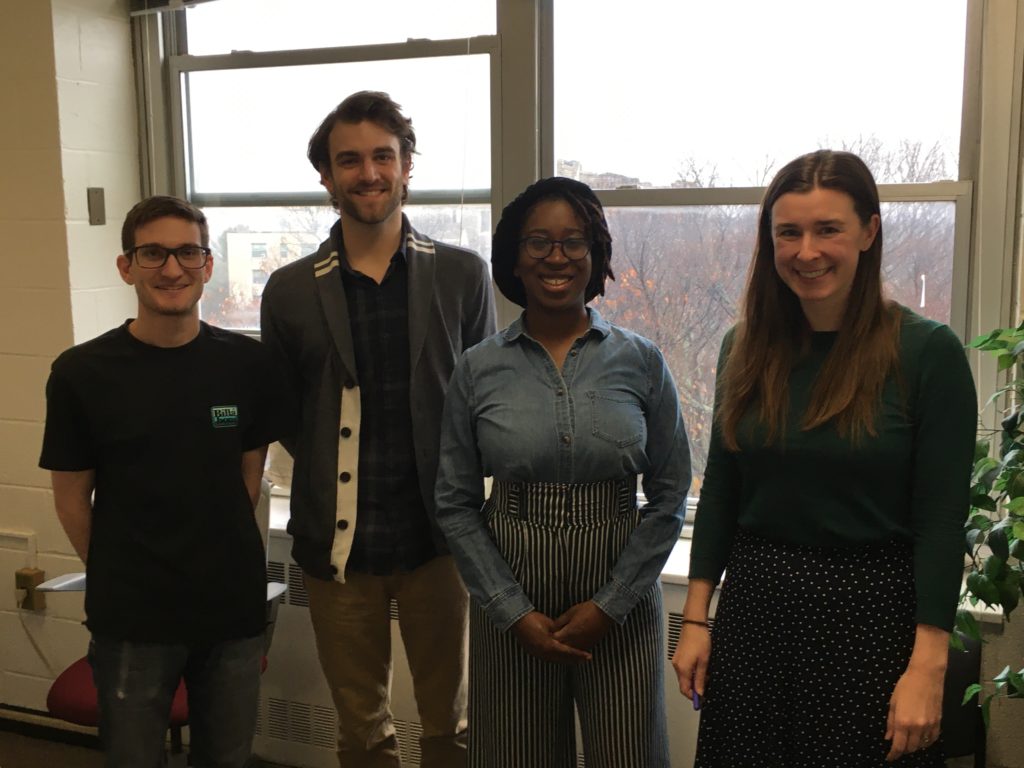
BAAHP celebrating uploading of interviews to Digital Commons with professors, students, and members of the community (l-r Morgan Mungerson, Eddie Mikus, Andrea Benintendi, Danielle Rowe, Dr. Jane Edward, Dr. Mark Naison, Robert Gumbs, and Damien Strecker)
As a follow up to the launch of the Bronx African American History Project’s archive of digital recordings, we asked Damien Strecker, a PhD student in History at Fordham, to tell us more about the project. He writes:
Last fall, I began my journey towards a PhD in History under the helpful guidance of Professor Mark Naison. Dr. Naison’s Communists in Harlem During the Great Depression greatly influenced my Master’s research on the nationalist activity of Harry Haywood, an active member of the Communist Party USA during the interwar period. My initial meeting with Dr. Naison to discuss my research assistantship with the Bronx African American History Project (BAAHP) provided a window into my new work environment. He passionately described to me the history of the project and the goals for the academic year—and then proceeded to crank up the bass on a Redman hip hop track he told me I had to hear. Entering my second year working on the project, the music is still playing and the important historical work continues to march forward.
Last year, I worked to accomplish a number of goals: 1) organize, label, and safely store the hard copies of all BAAHP files 2) digitize and safely store electronically as many files as possible 3) finish transcribing and summarizing old interviews. With the help of five undergraduate workers, we succeeded in transferring the physical materials of the project to Fordham’s Rare Books and Special Collection, digitizing the interview audio, and finishing nearly all of the transcriptions and summaries.
While the tasks seem straightforward, each week provided new and unforeseen challenges, especially in regards to file formatting. Where on campus can I find a mini-DV player? What audio and video formats are the most common and universal now? Do we format our files for Apples or PCs? The BAAHP began over a decade ago and the archive reflects the monumental changes in technology over that time period. The BAAHP collection includes VHS, DVD, analog audio cassettes, Mini-DVs, and CDs as well as a number of different antiquated electronic file formats. The general trend within history to digitize primary sources is a fantastic development that will bring the tools of history to anyone with internet access. However, the rapidly changing pace of file formats may complicate things as technology changes over time. One can envision a future historian in 20 years trying to unearth Windows Media Player software or QuickTime to read an important file. Despite possible technical difficulties, the digitization of historical archives is an exciting development that will make materials much more accessible to everyone. Don’t throw away your white gloves and microfilm reader just yet, but digitization is happening rapidly and the BAAHP is proud to be a part of this movement.
With the task of general organization and file format uniformity secured last year, we quickly accomplished the long held goal of making the interviews accessible electronically via Fordham’s Digital Commons. Now that the public can access the interview files via the internet, we can concentrate efforts on publicizing the archive’s content. People from 5 different continents accessed the files within the first week of going public. People from all over the world will get to access files covering topics ranging from early jazz, church activism, hip hop, education, and African immigration. Dr. Jane Edward of the African American Studies Department initiated the important work of chronicling the story of recent African immigrants in the Bronx.
The global reach of the BAAHP is promising, but ultimately, it is about the Bronx. In an effort to engage the community, the BAAHP will be creating curriculum materials that local educators can use in their classrooms. As a former middle school and high school social studies teacher, I know the actual process of interpreting and writing history can be intimidating for students and teachers alike. Starting next semester, we will begin giving presentations in local schools about Bronx history, oral history, and the BAAHP collection. Also, we will be disseminating a 3 day model mini unit for teachers. They can use it to get students excited about writing histories of local relevance and familiarity.
In the world of graduate school and academia, it is easy to get lost in our own worlds, reading, teaching, and researching. In the end, we all should desire to share what we have learned with the world—not just those privileged enough to scan their ID onto campus. I’m proud to work with BAAHP in their efforts to preserve and share the rich cultural history of the borough Fordham calls home. The cultural contours of the Bronx continue to change and the BAAHP will be there to make sure the people’s stories will not be forgotten.






